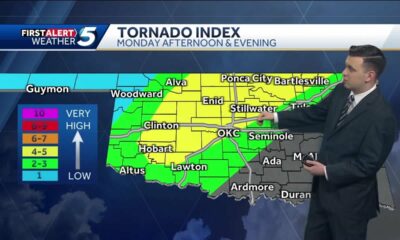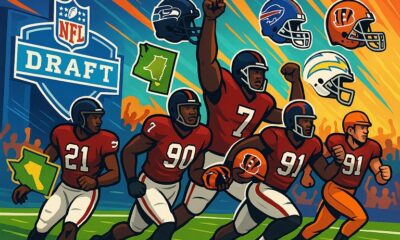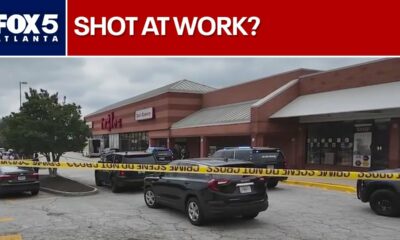News from the South - North Carolina News Feed
1,600 Buncombe voters swept up in GOP ballot challenge, as hand recount proceeds • Asheville Watchdog
Several dozen citizens and election officials gathered Wednesday at the Buncombe County Board of Elections headquarters in downtown Asheville to begin a laborious hand recount of thousands of 2024 election ballots, looking for any discrepancies that might call into question the outcome of a tight race for a North Carolina Supreme Court seat.
Meanwhile, the state Board of Elections is preparing to rule on a related challenge that, if successful, could toss out some 60,000 ballots statewide, including 1,600 cast in Buncombe County.
The North Carolina Republican Party and Jefferson Griffin, the Republican candidate for Seat 6 on the North Carolina Supreme Court, contend that the election boards of all 100 counties improperly counted ballots of ineligible or unverified voters — a claim that will be resolved by the North Carolina Board of Elections — and demanded a “hand-to-eye” count of ballots in all 100 counties. Griffin has the right to do so under law, because of the closeness of the voting.
A statewide machine recount last week confirmed initial election results that Griffin is trailing his Democratic opponent, the incumbent Allison Riggs, by 734 votes out of 5.5 million cast. Republicans currently hold a 5-2 advantage on the state’s highest court, and a victory by Griffin for an eight-year term would make it 6-1 and ensure GOP control of the bench for the next decade.
Riggs claimed victory this week and called for Griffin to concede. Griffin and the state Republican Party refused, saying they would pursue every avenue to reverse the outcome. While the hand-to-eye recount must be completed in five days, the challenge of voter legitimacy could delay the election results indefinitely.
“Our priority remains ensuring that every legal vote is counted and that the public can trust the integrity of this election,” state Republican Party spokesperson Matt Mercer said in a news release. Embry Owen, Riggs’s campaign manager, said Griffin’s protests were a “last-ditch effort to deny the will of voters across the state.”
Final rulings by the state board can be appealed to state court.
The parents of Allison Riggs are among the 60,000 voters whose ballots, the state Republican Party contends, should have been thrown out for a variety of reasons, which include attempting to vote as a felon; casting an absentee or early voting ballot but dying before the election; having official residence outside North Carolina, or lacking validation via the last four digits of a Social Security number or a North Carolina driver’s license.
The bulk of the challenges involve the Help America Vote Act of 2002, which in North Carolina requires voters to provide the last four digits of their Social Security number or their NC driver’s license number. Anyone attempting to vote in 2024 whose voter registration records did not already include the ID numbers should have been required at the polls to provide those numbers.
Under state law, all voters in 2024 were required to show proper identification before being allowed to vote. But there is no uniform method among the counties for capturing that information on voter forms. Even if a poll worker requested and verified a voter’s ID, precinct computers are not linked to any database for security reasons, so no corrections or additions to the registration could be made.
News that their ballots are being challenged came as a surprise to several Asheville voters on the list of 1,600 potentially “fraudulent” voters, they told Asheville Watchdog.
“I’m flattered to be included, but I have no idea what that’s about,” said John R. Nicolay of Asheville, who voted on Election Day with his wife, Ada. “Nobody tried to stop me from voting. We voted at the correct place. We voted in person. We showed proper identification.”
“This is amusing in a very frustrating way,” said Nicolay, whose Buncombe County voter registration records indicate he registered as unaffiliated in 2022 and has voted in three previous elections. Nicolay said he and Ada registered at the same time. Her ballot was not challenged.
Suzanne Escovitz is also on the GOP’s challenge list. She and her husband, Alan, went in person to register at the Buncombe County Board of Elections soon after moving to Asheville in 2008. Her Buncombe voter registration shows that she has voted in 26 previous elections without issue, as a registered Democrat.
“For sixteen and a half years I’ve voted with no problem,” Escovitz said. When she appeared at the North Asheville early voting site last month, “I showed them my driver’s license, which everybody had to do, to prove I am who I am,” she said. “I didn’t do anything wrong.”
“If the Board of Elections didn’t do what they were supposed to do, that’s on them,” Escovitz said, expressing anger that the state Republican Party seeks to invalidate all her votes since 2008. Her husband’s ballot was not challenged.
Given the heavy Democrat advantage in Buncombe, a substantial number of disqualified ballots here presumably would help the Republican candidate.
The recount: ‘hand to eye’
In a process that is repeating in all 99 other counties this week, election workers, administrators, and observers gathered Wednesday at Buncombe County’s Board of Elections building on Coxe Avenue to begin “hand-to-eye” counting of paper ballots.
In a cavernous room filled with rows of voting machines and stacks of ballot containers, four teams of partisan election workers — two Republicans and two Democrats for each — began a four-hour shift examining and tallying ballots. A second shift, also consisting of 16 workers split evenly by party affiliation, was scheduled to relieve them for the afternoon.
Corinne M. Duncan, Buncombe County’s director of elections, said the cost of the hand recount would be borne by Buncombe County taxpayers. Each counter is paid $17 an hour.
Paid election workers, Buncombe Board of Elections staff, and the county’s five board members also worked through last weekend on the machine recount demanded by Griffin. After feeding tens of thousands of ballots into high-speed scanners, the results were verified: The recount did not narrow the margin of Riggs’s lead by even one vote; there was no evidence of any discrepancies that would call the original results into question.
This week, rather than count all the ballots cast in Buncombe last month — more than 161,000 — the hand-to-eye recount that started Wednesday will examine a smaller, supposedly representative sample of 3 percent of all voting locations, chosen at random by the state board. In Buncombe, three sites were selected: the early voting site in west Asheville and two smaller precincts. Election officials estimated that 13,000 votes would be examined in all. Absentee ballots are not included.
By law, if enough discrepancies are found in the selected samples to suggest that the outcome could be overturned if extrapolated to all the state’s voting places, a full hand-to-eye recount of 5.5 million ballots would be ordered.

But no such discrepancies are expected, said Duncan. “This [recount] is sort of a rote following of the law,” Duncan said. “The thing that is tough is that the law doesn’t keep up with technology. With machines that are so accurate, the percentages should be smaller. So we’re being asked to do a lot of work that won’t materially change the results. The machines are all tested before the election. And after the election we do a sample audit. So we’ve already proven that the machines are going at it the right way.”
The hand-to-eye count is made easier this year by the county’s adoption of touchscreen voting machines for early voting. An estimated 12,000 of the ballots to be read this week were produced using ExpressVote XL touchscreens machines.
Unlike hand-marked paper ballots — which require voters to completely ink the inside of a bubble next to the name of the preferred candidate, often leading to incomplete markings, cross-outs, smudges, extraneous scribbles, voting for both candidates, and other mistakes that befuddle a machine reader — the touchscreen printout ballots are relatively clean, and prevent a voter from, say, inadvertently voting for both candidates.
The reviewers sit four to a table, one Republican and one Democrat on one side, verifying the name of the voter and the voter’s intent, calling out either “Jefferson” (for Griffin) or “Allison” (for Riggs). The paper ballots are then pushed to the other side of the table, where, again, one Republican and one Democrat tally the vote on paper in an old-fashioned way: four vertical lines and a diagonal line for five votes.
Each ballot gets touched by eight hands and scrutinized by eight eyeballs, divided equally along party lines. The process continues until all the ballots are counted and verified.
Sometimes, however, even human readers may be uncertain of the voter’s intent. In such cases, the ballot is flagged for further review. Did the voter place their mark near, but outside, the bubble? Did they change their mind, X-out the first vote, and draw an arrow indicating support for the opposing candidate?
The flagged ballots are then reviewed by the five members of the Buncombe County Board of Elections, all of whom were appointed by the North Carolina state Board of Elections: Chairman Jake Quinn, a Democrat, who was appointed by Gov. Roy Cooper; and Steven Aceto (Republican), Mary Ann Braine (Republican), Glen C. Shults Jr. (Democrat), and Sally Stein (Democrat).

Although deliberately assigned partisan roles, the 16 citizens counting the ballots Wednesday morning appeared to an observer to be united in the belief of civic duty, rather than divided by political beliefs.
Quinn, the board chair, called the election process a “sacred rite” of democracy, noting that whatever their political differences might be, all of the board members and vote-counters were focused on election integrity.
“I am proud of the way we do our work at the Buncombe County Board of elections and Buncombe County Election Services,” Quinn said, noting that every aspect of the recount is transparent and open to the community. The recount is even streamed online.
While the hand-to-eye recount is “a rote following of the law,” the Republican attempt to entirely disqualify tens of thousands of cast ballots is an effort to challenge the law itself.
The argument to reject ballots for lacking Social Security and driver’s license numbers has already been rejected by federal and state overseers. In October, federal district court Judge Richard Myers II, the chief district court judge for the Eastern District of North Carolina and a Republican who was appointed to the bench by then-President Donald Trump, rejected the GOP’s arguments for purging 225,000 people from the voter rolls over concerns about missing voter information.
Myers’s ruling said that allowing political party leaders or private citizens to remove people from the list of registered voters would move North Carolina “away from a democratic form of government.”
State law explicitly gives control over voter rolls to elections officials. North Carolina’s State Board of Elections (NCSBE), consisting of three Democrats and two Republicans, voted unanimously to dismiss similar GOP complaints.
The Republican-dominated N.C. state Senate voted this week to override Gov. Cooper’s veto of Senate Bill 382, which made Hurricane Helene relief for western North Carolina conditional on changes that strip powers from the governor and several statewide offices that Democrats won in November.
The legislation shifts control over Board of Elections appointments from Governor-elect Josh Stein, a Democrat, to the office of the state auditor, which will be occupied in 2025 by a Republican, Dave Boliek.The fate of the legislation now depends on the North Carolina House. Three Republicans from western North Carolina — Reps. Mike Clampitt (representing Jackson, Swain and Transylvania counties), Karl Gillespie (Cherokee, Clay, Graham, and Macon), and Mark Pless (Haywood, Madison, and Yancey) — opposed the bill when it passed in the lower chamber last month. Republicans need to flip all three votes to override Cooper’s veto.
Asheville Watchdog is a nonprofit news team producing stories that matter to Asheville and Buncombe County. Peter H. Lewis is The Watchdog’s executive editor and a former editor at The New York Times. Contact him at plewis@avlwatchdog.org. The Watchdog’s reporting is made possible by donations from the community.To show your support for this vital public service go to avlwatchdog.org/donate.
Related
The post 1,600 Buncombe voters swept up in GOP ballot challenge, as hand recount proceeds • Asheville Watchdog appeared first on avlwatchdog.org
News from the South - North Carolina News Feed
‘Our Wave’ Co-founder on support spaces for sexual assault survivors
SUMMARY: In recognition of Sexual Assault Awareness Month, North Carolina Governor Josh Stein announced a new sexual assault cold case unit to support survivors, with trauma-informed investigators dedicated to solving cases. Co-founder of Rwave, Brendan Michaelelsson, shared how their platform provides safe, anonymous spaces for survivors to share their stories and access resources. Since its launch in 2018, Rwave has helped survivors from 67 countries and all 50 U.S. states. Michaelelsson emphasized the importance of confidential platforms and suggested creating cultures of respect and safety in various environments. Rwave encourages volunteers and allies to get involved through their website.

April is Sexual Assault Awareness Month. ‘Our Wave’ Co-founder and CTO Brendan Michaelsen joined ABC11 to talk building support spaces for survivors and other resources.
Download: https://abc11.com/apps/
Like us on Facebook: https://www.facebook.com/ABC11/
Instagram: https://www.instagram.com/abc11_wtvd/
Threads: https://www.threads.net/@abc11_wtvd
TIKTOK: https://www.tiktok.com/@abc11_eyewitnessnews
News from the South - North Carolina News Feed
Juvenile offenders often denied parole in NC prisons even as adults
A decade after a federal judge ordered North Carolina to adopt a plan to give juvenile offenders serving life sentences a “meaningful opportunity” for parole, a lawsuit making its way through the court system says the state has failed to follow through.
Earlier this month a judge denied the state’s motion to dismiss the suit, which was filed in 2023, noting “concerning” accounts of omitted and false information in plaintiff Brett Abrams’ parole file.
Abrams, 56, is serving a life sentence for murder at the minimum security prison in Hillsborough. He leaves prison five days a week to work a full-time job at a meat packing plant. In his 40 years of incarceration, he’s accrued 11 infractions, the last being in 2005.
On paper, he seems like a great candidate for parole. But the four-person commission that has sole discretion over parole decisions in North Carolina has denied him every time since he first became eligible in 1993.
Abrams has undergone two parole reviews since the state implemented its new process for juvenile offenders — colloquially known as the “Hayden Plan” for the case Hayden v. Keller that spurred its creation.
However, he continues to be denied his freedom.
A brutal killing
In 1983, Abrams stabbed and killed his 20-year old neighbor at her parents’ home after she confronted him for secretly watching her sunbathe. Abrams was 14 at the time of the slaying, and at 15 he was charged as an adult and sentenced to life imprisonment after pleading guilty to second-degree murder.
Depositions from Abrams’ lawsuit revealed his parole file had omitted crucial information that might have helped with his release. It also contained inaccurate information, including that he had an open homicide case against him for the 1982 death of his brother. In reality, the Iredell County Sheriffs’ Office had ruled the death an accident and closed the case.
“We saw in his profile pretty significant, very material mistakes that included misleading information, lies, things that were simply not true which we believe are so significant that it’s a sort of evidence in itself that the system is broken,” Abrams’ attorney, Jake Sussman, told Carolina Public Press.
And despite Abrams seeking psychological counseling and treatment based on the recommendation of the Parole Commission in 2018, those records were not included in his 2020 review.
“One would assume accurate and comprehensive summaries with relevant information would be essential where commissioners vote on more than 100 cases a day,” Judge Richard Myers wrote in his April 2 ruling.
The court cannot reverse the decisions made by the state’s Parole Commission, meaning the legality of Abrams’ continued incarceration is not being questioned. But Myers determined it is “within this court’s purview to review for Eighth Amendment violations,” as proven in Hayden v. Keller.
“What we’ve asked the judge to do is to find that the current system is unconstitutional as it applies to Mr. Abrams, and therefore as it would apply to all of the juvenile offenders, and develop a plan to actually have a review process that works,” Sussman said.
Juvenile offenders at mercy of the system
Decades of judicial rulings have given states plenty of discretion over how to handle the parole process.
North Carolina’s system has changed several times, and starting in 1994 the state eliminated parole altogether in favor of a different system called “structured sentencing,” which sets a minimum sentence and allows the Parole Commission to set the terms of release for felons once they reach that mark.
Those imprisoned prior to 1994 are still subject to the state’s older system, which Sussman described as a “constitutional mess,” particularly for juvenile offenders.
Two U.S. Supreme Court decisions from the 2010s — Graham v. Florida and Miller v. Alabama — resulted in monumental changes for people serving life sentences due to crimes they committed as juveniles. In those rulings, the Supreme Court severely limited states’ abilities to administer life sentences without parole to juvenile offenders, deciding that such actions constituted “cruel and unusual punishment” under the Eighth Amendment.
The logic behind that ruling is that juvenile offenders are more likely to respond to rehabilitation and reform compared to people imprisoned for crimes they committed later in life.
“Research in the area of brain development shows that the brain is not fully developed until about age 25,” explained Erin Fitzgerald, a professor at Elon University who specializes in juvenile justice. “This lack of development makes juveniles more impulsive, susceptible to peer pressure and unable to fully appreciate the consequences of their actions. However, it also makes them more malleable and capable of rehabilitation.”
Justice for juvenile offenders
The Hayden Plan at the center of Abrams’ lawsuit was born out of the precedent set by the Graham and Miller cases.
In 2010, a North Carolina inmate serving a life sentence for sexual assaults he committed as a teenager in the 1980s sued the Parole Commission for not giving him a fair chance to make his case for release.
His name was Shaun Hayden.
Every year after becoming eligible for parole, Hayden would receive the same letter from the commission saying that he had been denied parole, despite never having interacted with them in any way or being notified that he was up for review.
“He didn’t think that was fair, and he was correct,” said Ben Finholt, who was one of Hayden’s attorneys in his lawsuit against the commission. “It was a sham parole system where (the commission) never talked to anyone. They just review documents every year, and if not much changes, then you just get denied every year without them ever talking to you.”
A District Court ruled in Hayden’s favor, citing the U.S. Supreme Court’s decision in Graham v. Florida. The state lost its appeal and in 2018 was directed to implement a new plan for handling parole review for juvenile offenders.
That plan guaranteed juvenile offenders a 30-minute video conference with one of the commissioners, a specialized case analyst and, in the case of denial, a letter detailing why the inmate was denied parole and recommendations for future reviews.
New parole plan, old issues
The new plan hasn’t exactly led to substantive changes, however.
Finholt, who now serves as Abrams’ attorney for his parole review (separate from the lawsuit that Sussman is handling), has had a firsthand account of the Hayden Plan’s shortcomings.
“The parole case analyst in Brett’s case admitted under oath that she did not consider the advocacy letter that I wrote for Brett in 2020, that it was not part of the record and that she had made no changes to her process based on the fact that the person being considered for parole was a juvenile,” he said. “That is explicitly contrary to (the Hayden court’s) holding that people who were kids at the time of the crime are entitled constitutionally to a different process.”
That was one of the reasons Myers, the judge in Abrams’ lawsuit, denied the state’s motion to dismiss the suit.
However, Myers also wrote that it is “still unclear” based on the facts of the case whether the commissioners would have changed their decision on Abrams if the information in his file had been completely accurate.
He declined to rule in favor of either party and ordered more discovery on the matter. When that is completed in June, he may issue a final ruling or set a trial date.
Sussman said that if Abrams wins this lawsuit, he would advocate for a decision-making process that is less arbitrary, such as a rubric or points-based system.
Finholt has also advocated for such a change, and he said it makes sense regardless of people’s opinions regarding parole.
“My personal feeling, based on my long professional experience, is that most of the folks who are up for parole would do just fine outside of prison,” he said. “However, even if you’re a person who disagrees with me on that front, you should still dislike the current process because it’s not informed by any evidence or any data.
“If you’re the kind of person who thinks that most folks should stay inside, you should also be horrified by the fact that these release decisions are being made essentially on people’s guts.”
This article first appeared on Carolina Public Press and is republished here under a Creative Commons Attribution-NoDerivatives 4.0 International License.![]()
The post Arrest of Wisconsin judge ‘escalation’ in Trump-judiciary conflict, Democrats warn appeared first on tennesseelookout.com
Note: The following A.I. based commentary is not part of the original article, reproduced above, but is offered in the hopes that it will promote greater media literacy and critical thinking, by making any potential bias more visible to the reader –Staff Editor.
Political Bias Rating: Center-Left
The content presents a case focused on the rights of juvenile offenders, specifically in relation to parole decisions. The emphasis on rehabilitation, fairness in parole processes, and concerns over the accuracy and fairness of the system reflects a more progressive, or center-left, perspective. It advocates for juvenile offenders’ opportunity for parole based on their potential for reform, which aligns with broader left-leaning views on criminal justice reform and the belief in rehabilitation over punitive measures. The inclusion of legal cases like Graham v. Florida and Miller v. Alabama suggests an alignment with the idea of justice for juvenile offenders in line with constitutional protections. While the tone is not overtly political, the framing of the issues reflects concerns typically associated with progressive criminal justice reform.
News from the South - North Carolina News Feed
Mental health pros worry about possible cuts to 988 hotline funding
SUMMARY: Mental health professionals express concern over potential cuts to the 988 suicide prevention hotline, particularly for LGBTQ+ youth. A leaked budget draft reveals the Trump administration’s proposal to eliminate funding for specialized services. Since its launch in July 2022, the hotline has answered over 219,000 calls, with rising demand for mental health services noted by professionals like Shawn Thomas. The North Carolina Department of Health emphasizes that federal funding is crucial for timely call responses and effective service delivery. Advocates are alarmed, warning that losing this resource would significantly impact vulnerable populations.

Mental health professionals say the 988 hotline is an invaluable resource, and any cuts would affect the strides being made in the state to meet growing demand.
Story: https://abc11.com/post/mental-health-professionals-worry-possible-cuts-988-suicide-hotline-funding/16248556/
Download: https://abc11.com/apps/
Like us on Facebook: https://www.facebook.com/ABC11/
Instagram: https://www.instagram.com/abc11_wtvd/
Threads: https://www.threads.net/@abc11_wtvd
TIKTOK: https://www.tiktok.com/@abc11_eyewitnessnews
-

 News from the South - Missouri News Feed1 day ago
News from the South - Missouri News Feed1 day agoMissouri lawmakers on the cusp of legalizing housing discrimination
-

 News from the South - Alabama News Feed6 days ago
News from the South - Alabama News Feed6 days agoPrayer Vigil Held for Ronald Dumas Jr., Family Continues to Pray for His Return | April 21, 2025 | N
-

 Mississippi Today6 days ago
Mississippi Today6 days ago‘Trainwreck on the horizon’: The costly pains of Mississippi’s small water and sewer systems
-

 News from the South - Florida News Feed5 days ago
News from the South - Florida News Feed5 days agoTrump touts manufacturing while undercutting state efforts to help factories
-

 News from the South - Texas News Feed6 days ago
News from the South - Texas News Feed6 days agoMeteorologist Chita Craft is tracking a Severe Thunderstorm Warning that's in effect now
-

 News from the South - Florida News Feed5 days ago
News from the South - Florida News Feed5 days agoFederal report due on Lumbee Tribe of North Carolina’s path to recognition as a tribal nation
-

 News from the South - Virginia News Feed6 days ago
News from the South - Virginia News Feed6 days agoTaking video of military bases using drones could be outlawed | Virginia
-

 Mississippi Today3 days ago
Mississippi Today3 days agoStruggling water, sewer systems impose ‘astronomic’ rate hikes















































